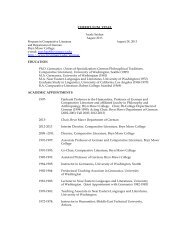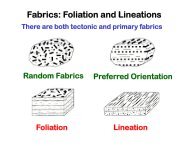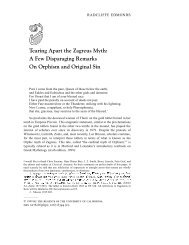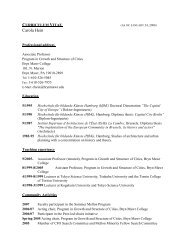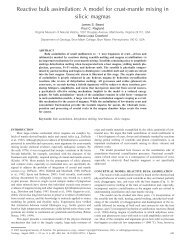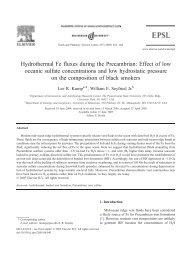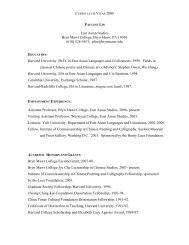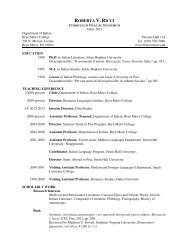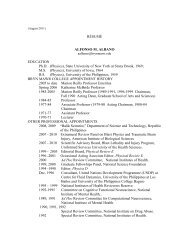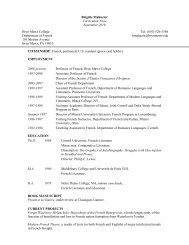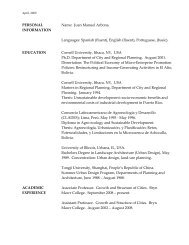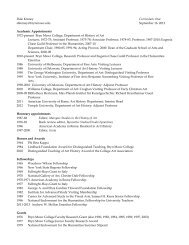Rediscovering Ying Qu and His Poetic Relationship to Tao Qian (clik ...
Rediscovering Ying Qu and His Poetic Relationship to Tao Qian (clik ...
Rediscovering Ying Qu and His Poetic Relationship to Tao Qian (clik ...
Create successful ePaper yourself
Turn your PDF publications into a flip-book with our unique Google optimized e-Paper software.
<strong>Ying</strong> <strong>Qu</strong> <strong>and</strong> <strong>His</strong> <strong>Poetic</strong> <strong>Relationship</strong> <strong>to</strong> <strong>Tao</strong> <strong>Qian</strong> 63<br />
揚 雄 “Zhupin fu” 逐 貧 賦 <strong>and</strong> Cai Yong’s “Jiu wei” 九 惟 .95 As far as I<br />
know, <strong>Ying</strong> <strong>Qu</strong> is the first <strong>to</strong> write extensively on poverty, as witnessed<br />
in these letters.<br />
It was only some ten <strong>to</strong> twenty years after <strong>Ying</strong> <strong>Qu</strong>’s death that appropriating<br />
earlier gestures <strong>and</strong> stances <strong>to</strong> describe one’s own impoverishment<br />
became widespread among poets. Like <strong>Ying</strong> <strong>Qu</strong>, Jin writers<br />
borrowed many tropes of the impoverished gentleman from earlier<br />
texts (for instance the Lunyu <strong>and</strong> the Han shu); as with <strong>Ying</strong> <strong>Qu</strong>, these<br />
writers alluded <strong>to</strong> poverty but not necessarily as accurate reflections of<br />
their own lives. The two extant Western Jin poems on living an impoverished<br />
life are by Jiang You 江 逌 <strong>and</strong> Zhang Wang 張 望 , who once<br />
served as lower ranking officials, with positions similar <strong>to</strong> that held by<br />
<strong>Tao</strong> <strong>Qian</strong>. Jiang You wrote a “Yongpin shi” (On poverty) that depicts<br />
the familiar abode of the poor: “The thatched gate does not open, /<br />
The surrounding walls are covered with weeds <strong>and</strong> foliage. / A ladle<br />
lies turned against the wall, / While dust collects in the rice bin” 蓽 門<br />
不 啟 扉 , 環 堵 蒙 蒿 榛 . 空 瓢 覆 壁 下 , 簞 上 自 生 塵 .96 These lines display<br />
the attri butes of the impoverished gentleman (the unused ladle <strong>and</strong> the<br />
bin gathering dust) that <strong>Ying</strong> <strong>Qu</strong> mentioned in his letters. The images<br />
also appear later in <strong>Tao</strong> <strong>Qian</strong>’s poetry: the thatched gate that shuts out<br />
un invited visi<strong>to</strong>rs, the natural growth surrounding his house, <strong>and</strong> the<br />
empty rice bin.97<br />
Zhang Wang, a near contemporary of Jiang You <strong>and</strong> an administra<strong>to</strong>r<br />
under General Huan Wen 桓 溫 (canjun 參 軍 , a position comparable<br />
<strong>to</strong> one held by <strong>Tao</strong> <strong>Qian</strong>), likewise wrote a “Pinshi shi” (Poem<br />
on the impoverished gentleman). <strong>His</strong> poem shares many of the tropes<br />
on poverty seen in <strong>Ying</strong> <strong>Qu</strong>’s letter <strong>to</strong> Cao Changsi. Where <strong>Ying</strong> says of<br />
his quiet life in retirement, “there are no tracks of carriages outside my<br />
gate” <strong>and</strong> “no curious students in my hall,” Zhang Wang writes: “Few<br />
traces are there of human beings in this ab<strong>and</strong>oned village, / Secluded<br />
<strong>and</strong> distant, from the neighbors far removed. / [My] rush fences crumbling<br />
/ While I am inside the dilapidated rooms it is open <strong>and</strong> vast,<br />
bare <strong>and</strong> empty” 荒 墟 人 迹 稀 , 隱 僻 閭 鄰 闊 . 葦 籬 自 朽 損 , 毀 屋 正 寥<br />
95<br />
Both are included in Yiwen leiju, 35.29b–31a, 33a.<br />
96<br />
Yiwen leiju, 35.29a.<br />
97<br />
See Lu Qinli, 2:991; 978, 991, 1010; 980, respectively.




